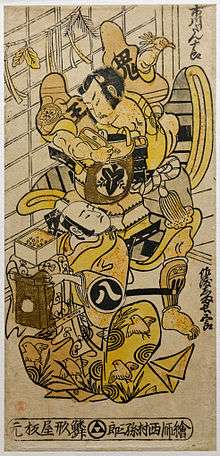Ichikawa Danjūrō II
Ichikawa Danjūrō II (二代目 市川 團十郎, Nidaime Ichikawa Danjūrō, 1688–1758) was a Japanese kabuki performer in the lineage of a celebrated family of actors from the Edo region.[1] Ichikawa Danjūrō is a stage name.
Ichikawa Danjūrō II | |
|---|---|
 Ichikawa Danjūrō II as Kio, and Sadojima Chojoro as Soga no Juro in a scene from the New Year's kabuki play, Hatsu-goyomi akinai Soga at Nakamura-za theatre. | |
| Born | 1688 |
| Died | 1758 (aged 69–70) |
| Nationality | Japanese |
| Occupation | Kabuki performer |
| Known for | Part of a celebrated family of actors from the Edo region |
Career
The earnestly prayed-for son of Ichikawa Danjūrō I, Danjūrō II acted under the name Ichikawa Kuzō I from 1697 to 1704, the year his father was killed in a backstage quarrel with another actor. Danjūrō II assumed his father's stage name five months after this incident and held it until 1735, when he took the name Ichikawa Ebizō II.[1] Thereafter, the name was handed down in a direct line through the generations, e.g., Danjūrō III and Danjuro IV were the adopted sons of Danjūrō II; Danjūrō VI was the adopted son of Danjūrō V, and Danjūrō VII was the adopted son of Danjūrō VI.[2]
In the conservative Kabuki world, stage names are conveyed in formal system which converts the kabuki stage name into a mark of accomplishment.[3] In 1840, Danjūrō IV created Kabuki Jūhachiban to remind the theater world of his family's pre-eminence in Kabuki, especially in the creation and development of aragoto roles. This collection of 18 plays is a compilation of his and his predecessors representative roles. The work features the character Benkei, who was played by Danjūrō I and Danjūrō II.[4] This is the ie no gei (family art) of the Danjuro line.[5]
Lineage of Danjūrō stage names
- Ichikawa Danjūrō I (1660–1704)[5]
- Ichikawa Danjūrō II (1688–1758)[5]
- Ichikawa Danjūrō III (18th century)[1]
- Ichikawa Danjūrō IV (1711–1778)[1]
- Ichikawa Danjūrō V (1741–1806)[5]
- Ichikawa Danjūrō VI (18th–19th century)[1]
- Ichikawa Danjūrō VII (1791–1859)[1]
- Ichikawa Danjūrō VIII (1822–1854)[6]
- Ichikawa Danjūrō IX (1838–1903)[5]
- Ichikawa Danjūrō X (19th century)[1]
- Ichikawa Danjūrō XI (1909–1965)[1]
- Ichikawa Danjūrō XII (1946–2013)[1]
Notes
- Nussbaum, Louis Frédéric et al. (2005). "Ichikawa Danjūrō" in Japan Encyclopedia, p. 369., p. 369, at Google Books
- Edelson, Loren. (2009). Danjūrō's Girls: Women on the Kabuki Stage, p. 200., p. 200, at Google Books
- Scott, Adolphe C. (1999). The Kabuki Theatre of Japan, p. 159., p. 159, at Google Books
- Leiter, Samuel. (2006). Historical Dictionary of Japanese Traditional Theatre, p. 145., p. 145, at Google Books
- Leiter, Samuel. (2002). A Kabuki Reader: History and Performance, p. 255, p. 255, at Google Books
- Toronto Public Library, Utagawa Kunisada, also known as Toyokuni III (1786-1865); Obituary portrait of actor Ichikawa Danjuro VIII, 1854
References
- Leiter, Samuel L. (2006). Historical Dictionary of Japanese Traditional Theatre. Lanham, Maryland: Scarecrow Press. ISBN 978-0-8108-5527-4; OCLC 238637010
- __________. ( 2002). A Kabuki Reader: History and Performance. ISBN 9780765607041; ISBN 9780765607058; OCLC 182632867
- Nussbaum, Louis Frédéric and Käthe Roth. (2005). Japan Encyclopedia. Cambridge: Harvard University Press. ISBN 978-0-674-01753-5; OCLC 48943301
- Scott, Adolphe Clarence. (1955). The Kabuki Theatre of Japan. London: Allen & Unwin. OCLC 622644114
